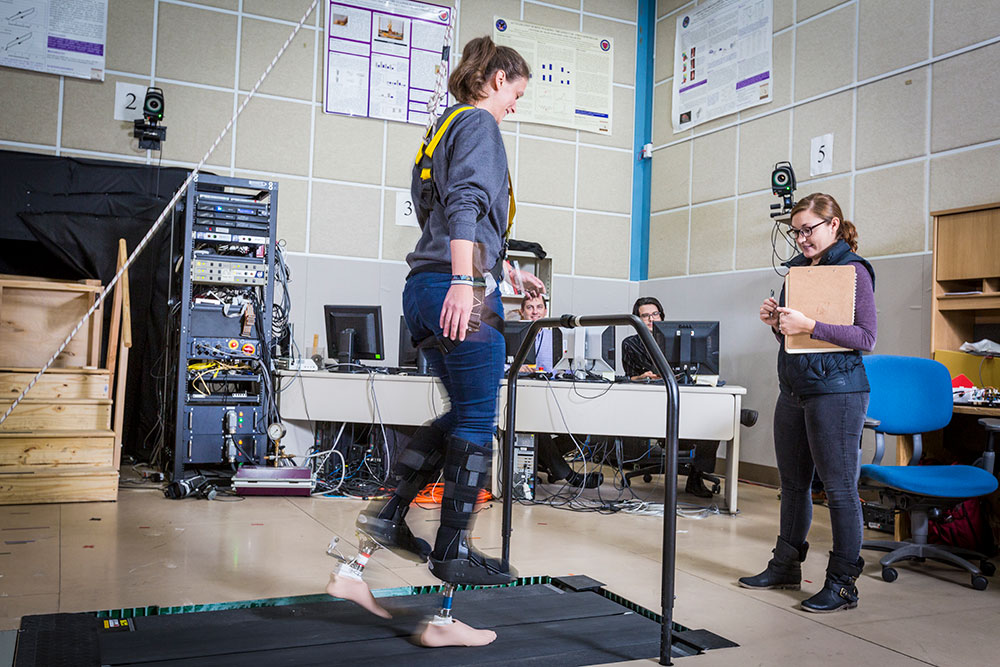Simply speaking, mechanical engineering deals with understanding how things work, from the tiniest micro-particle to the largest spacecraft, and even the human body—one of our most complex machines. It is the broadest of all engineering disciplines, and interdisciplinary work is key to our department’s success.

What do mechanical engineers do?
Mechanical engineers are at the center of technological and environmental advancements and work broadly in mechanical, environmental and material-based problems. Mechanical engineers design and create everything from microsensors, medical devices, computers and car engines to robots, cookstoves, sports equipment and airplanes.
What problems are mechanical engineers trying to solve?
Mechanical engineers seek new knowledge through research, creative design and development, and with the construction, control, management and sales of the devices and systems needed by society. Mechanical engineers ask:

- How can we identify and develop efficient, renewable sources of energy and scale to meet the world’s energy needs amid a rapidly warming planet?
- How can we optimize prosthetics and assistive devices to reduce mobility limitations among people with disabilities?
- How can we develop diagnostic tools to aid in the earlier detection of cancer?
- How can we combine start-to-finish design thinking and engineering principles to turn an idea into a solution?
What makes ME special?
Mechanical engineering is one of UW's largest and most popular engineering departments. We draw talented and creative students and offer a world-class education with an incredible breadth of skill and technological training. Our graduates are making a difference in diverse sectors such as biotechnology and health, environmental engineering and energy, transportation, manufacturing and information systems.

Undergraduate students have the option to choose a direct pathway: mechatronics, biomechanics or nano-science and molecular engineering. All undergraduate students complete a senior capstone project, for example by solving medical challenges through Engineering Innovations in Health (EIH).
Graduate students can choose to specialize in biomechanics, controls, mechatronics & robotics, dynamics & vibrations, energy, fluid mechanics/microfluidics or mechanics, materials & manufacturing. Data science degree options are also available. Many students at both levels utilize the flexibility of the degree to participate in internships, study abroad and pursue research.
Where do ME alumni work?
Mechanical engineers are employed in nearly every kind of industry and business type, from small startups to Fortune 500 companies. They are involved with seeking new knowledge through research, creative design and development, and with the construction, control, management and sales of the devices and systems needed by society. Additionally, some mechanical engineers take their knowledge and apply it to non-traditional career pathways in medicine or law.
-
Air and space
Aircraft composites, strength testing, additive manufacturing, 3D printing and rapid prototyping | Employers: Blue Origin, Boeing, Electroimpact, Safran, SpaceX -
Computing, data and digital technologies
Machine learning and big data, fault detection in manufacturing, disease detection, printed and flexible electronics | Employers: Boeing, Blue Origin, Amazon, Honeywell, Intel, UW Medicine -
Environment, sustainability and energy
Batteries and energy storage, hybrid and electric vehicles, low-emission combustion, wind, solar and marine energy | Employers: GM, PNNL, Sedron Technologies, Tesla -
Health and medicine
Prosthetics and orthotics, cryopreservation, biomechanics, photonics | Employers: Nike, Origincell, Seattle Veteran’s Affairs Medical Center -
Infrastructure, transportation and society
Point-of-care diagnostics, autonomous systems and self-driving vehicles | Employers: Paccar, Puget Sound Naval Shipyard, WSDOT -
Robotics and manufacturing
Mechatronics, autonomous systems, sensors and actuators, controls and system dynamics, prosthetics, virtual reality, bio-robotics | Employers: Amazon, Blue Origin, Boeing, Genie, Janicki Industries
Apply for admission
Interested in pursuing a degree in mechanical engineering? Visit the admission section to learn how.